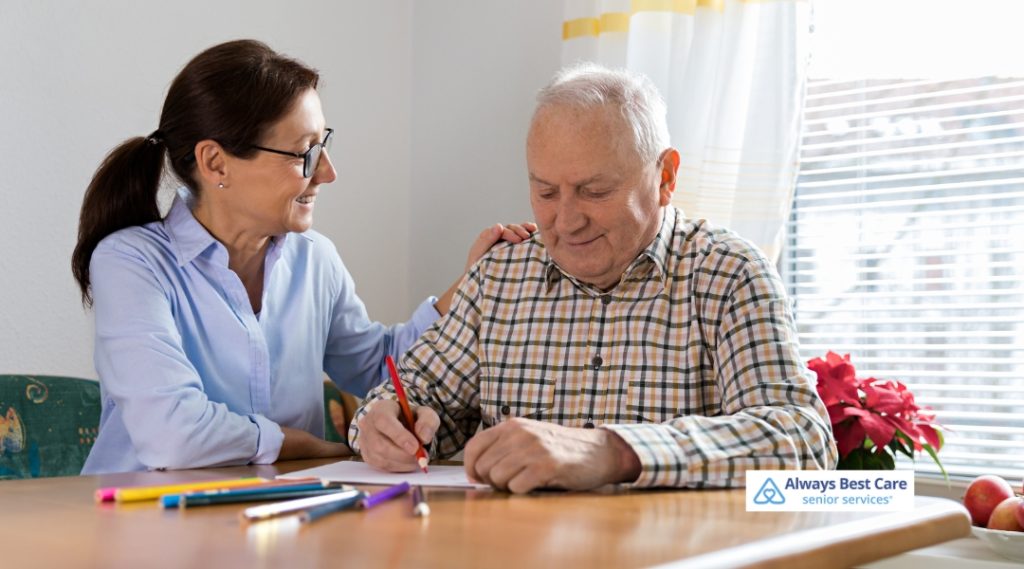Lost and Found: Navigating Dementia and Protecting Seniors in Houston

Caring for someone with dementia can sometimes feel like you’re walking a tightrope, especially when it comes to wandering.
Suddenly, a loved one who always knew their way around is nowhere to be found. It’s not just unsettling; it can be downright dangerous.
At Always Best Care of Houston Metro, we get how nerve-wracking this can be, and we’re here to help keep your family safe and sound.
What you will learn:
- Why seniors with dementia may wander and the common signs to watch for.
- Practical strategies to create a safer home and reduce the risk of wandering.
- The benefits of memory care services and how they support both families and loved ones.
Table of Contents
Why Do People with Dementia Wander?
When memory slips and the world seems topsy-turvy, folks living with dementia might wander off; no rhyme or reason needed. It’s more than just getting lost; it’s often sparked by confusion or restlessness that won’t quit.
Common triggers include:
- Searching for someone or something familiar.
- Trying to stick to an old routine (like heading off to work).
- Feeling anxious or overwhelmed by noise.
- Boredom that makes sitting still unbearable.
- Disorientation about where or even when they are.

Spotting 5 Wandering Warning Signs
Before a loved one takes off without warning, there are usually some telltale hints:
- Repeatedly trying doors or talking about “going home.”
- Mentioning past routines (workplace visits, school pickups).
- Growing anxious in crowded places.
- Trouble recognizing once-familiar surroundings.
- Pacing near exits like they’ve got ants in their pants.
How to Reduce the Risk of Wandering
Good news: There are plenty of tricks up our sleeves for reducing those chances and helping everyone sleep better at night.
Secure the Environment
- Install door alarms and motion sensors.
- Use locks placed out of sight.
- Consider pressure mats by exits.
- Try GPS tracking devices if needed.
Stick with a Routine
Keeping days structured helps cut down anxiety and cuts off boredom before trouble starts:
- Plan regular mealtimes & activities.
- Mix up physical movement with brain games.

Limit Triggers
Even little things, like noisy TVs, can set nerves jangling:
- Keep spaces calm and predictable.
- Avoid overwhelming environments.
Meet Emotional Needs
Restless hands often mean lonely hearts:
- Encourage hobbies together.
- Bring in friends or volunteers.
Label Rooms and Add Visual Cues
Simple signs work wonders:
- Post labels on rooms/doors.
- Use color-coded arrows as gentle guides.
Let Neighbors Know
Houston is full of helpful folks! Loop trusted neighbors into what’s going on, so another pair of eyes is always watching out.
Is Memory Care the Next Step?
Sometimes, love isn’t enough; you need backup. If your home starts feeling less safe despite your best efforts, specialized memory care might be what keeps everyone breathing easy again.
Here at Always Best Care of Houston Metro:
| What We Offer | Why It Matters |
| 24/7 Supervision | Never a moment unsupervised |
| Trained Staff | Expertise meets compassion |
| Secure Exits/Entrances | No accidental escapes |
| Therapeutic Programs | Keeps minds engaged & spirits high |
| Personalized Plans | Tailored support every day |
Choosing this step means building new routines rooted in dignity and respect while boosting security.
FAQs About Dementia Wandering Safety in Houston
Q: Why does my loved one keep saying they want “to go home” even though they’re already there?
A: This common phrase signals confusion about time/place—a hallmark sign that wandering could happen soon.
Q: What should I do if my parent wanders away from our house?
A: First thing: call emergency services right away! Then let us know so we can help plan safer solutions moving forward.
Q: Are door alarms really necessary?
A: Absolutely! They offer immediate alerts, so you catch movement before anyone gets far from sight.
Q: Can routine changes make wandering worse?
A: Sudden changes may spark anxiety, leading straight toward wandering behaviors; consistency truly counts here!
Learn How to Prevent Wandering and Support Loved Ones with Dementia Today!
Living with dementia brings daily surprises, but safety shouldn’t be one of them. At Always Best Care of Houston Metro, we understand every family wants peace of mind as much as loving care itself.
Contact Always Best Care of Houston Metro at (713) 485-5000 to learn more and schedule your free consultation.





